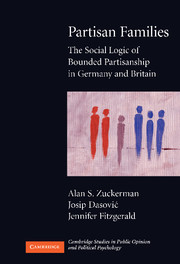Book contents
- Frontmatter
- Contents
- List of Figures and Tables
- Acknowledgments
- Preface: The Theoretical Approach, the Question, and the Data
- 1 The Social Logic of Partisanship: A Theoretical Excursion
- 2 Bounded Partisanship in Germany and Britain
- 3 A Multivariate Analysis of Partisan Support, Preference, and Constancy
- 4 Bounded Partisanship in Intimate Social Units: Husbands, Wives, and Domestic Partners
- 5 Bounded Partisanship in Intimate Social Units: Parents and Children
- 6 Partisan Constancy and Partisan Families: Turnout and Vote Choice in Recent British Elections
- Conclusion: Family Ties, Bounded Partisanship, and Party Politics in Established Democracies
- Appendix
- References
- Index
- Books in the Series
Preface: The Theoretical Approach, the Question, and the Data
Published online by Cambridge University Press: 05 June 2012
- Frontmatter
- Contents
- List of Figures and Tables
- Acknowledgments
- Preface: The Theoretical Approach, the Question, and the Data
- 1 The Social Logic of Partisanship: A Theoretical Excursion
- 2 Bounded Partisanship in Germany and Britain
- 3 A Multivariate Analysis of Partisan Support, Preference, and Constancy
- 4 Bounded Partisanship in Intimate Social Units: Husbands, Wives, and Domestic Partners
- 5 Bounded Partisanship in Intimate Social Units: Parents and Children
- 6 Partisan Constancy and Partisan Families: Turnout and Vote Choice in Recent British Elections
- Conclusion: Family Ties, Bounded Partisanship, and Party Politics in Established Democracies
- Appendix
- References
- Index
- Books in the Series
Summary
Social relationship: The behavior of a plurality of actors insofar as, in its meaningful content, the action of each takes account of that of the others and is oriented in these terms.
Max Weber, Economy and Society I, 26To those [guards] who do not talk to you … you dare not speak. If you are fortunate enough to have someone next to you with whom you have a common language, good for you, you'll be able to exchange your impressions, seek counsel, let off steam, confide in him; if you don't find anyone, your tongue dries up in a few days, and your thought with it.
Primo Levi, The Drowned and the Saved, 71We offer a simple story. How do people decide about political parties? Much as they make other decisions. They take into account the preferences, values, expectations, and perceptions of their family, friends, colleagues, and neighbors., People affect one another, and so any one decision responds to the particular mix of views in a person's social networks. As Max Weber, a founder of social science, taught, and as Primo Levi witnessed in the Holocaust: people live and experience their lives and their thoughts in social relationships. How and what they think about politics and what they do are the outcomes of social processes.
- Type
- Chapter
- Information
- Partisan FamiliesThe Social Logic of Bounded Partisanship in Germany and Britain, pp. xv - xxviiiPublisher: Cambridge University PressPrint publication year: 2007



